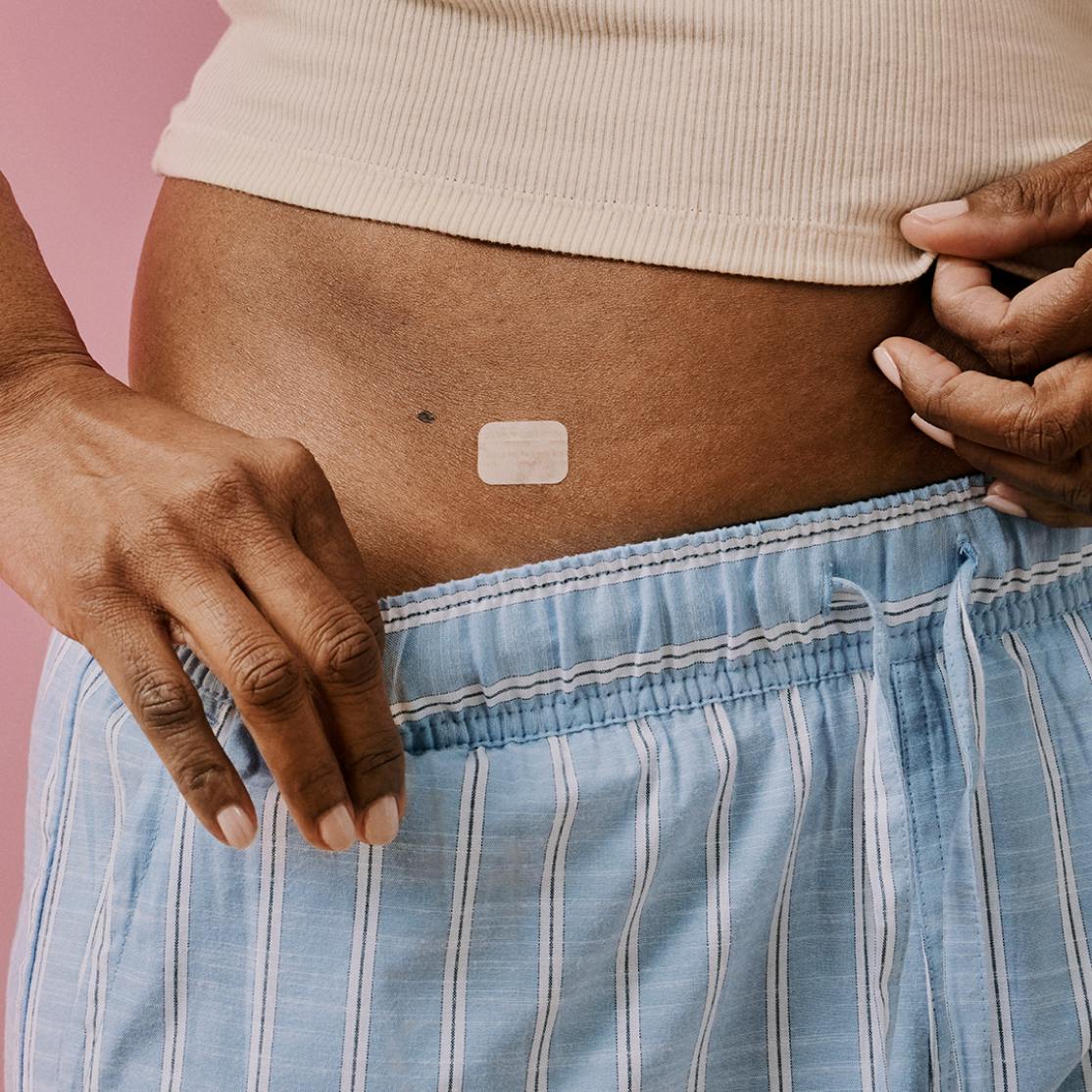Hormone replacement therapy (HRT) is one of the most searched for—and most misunderstood—treatments for women in midlife. Adding back just a tiny fraction of the sex hormones that naturally diminish with age, like estrogen and progesterone, can be a game changer for many peri- and post-menopausal women. Yet misinformation fueled by decades-old, faulty research and conflicting advice from behind-the-times healthcare professionals often discourage women from even asking about hormonal therapy.
Midi Health is an expert on HRT benefits, including relief from hot flashes, night sweats, vaginal dryness, and other stressful symptoms of perimenopause and menopause. Our personalized, science-backed prescriptions and reassurance can help you cut through the misinformation and optimize your midlife wellness.
During perimenopause—the years leading up to your final period—your body becomes a bustling hub of hormonal change. Picture Grand Central Station, only instead of passengers racing to make their trains, baristas serving coffee and bagels, and tourists pausing to gawk at interesting architectural details, you’ve got estrogen levels zigzagging all over the place, progesterone taking the elevator down to the basement, and testosterone swinging from the chandelier. The result: An arrivals board filled with symptoms like irregular periods, hot flashes, and an even hotter temper, while your memory and libido are scheduled to depart at totally unpredictable times.
Hormone replacement therapy (HRT) is a type of medication used during perimenopause and menopause to replenish some of the hormones that naturally decline with age. For many women, it’s a light at the end of the tunnel. The words “hormone replacement therapy” are a tad misleading, as you’re not exactly replacing the hormones, so much as you’re supplementing them, adding back in just a fraction of what you made during your 20s and 30s. For this reason, HRT is sometimes called menopausal hormone therapy (MHT) or just hormone therapy (HT). But as with acronyms like “LOL,” “IRS,” and “BOGO,” the letters “HRT” have been burned into the collective consciousness, so that’s what we’ll use throughout this story.
Widely considered the most effective treatment for relieving some of the most stressful symptoms of perimenopause and menopause, HRT works by helping blunt some of the physiologic effects of rapidly shifting hormone levels. Depending on your most irksome symptom, the effects are usually felt within weeks.
You might even consider hormone therapy a form of health insurance, as starting HRT within 10 years of your last period can reduce your future risk of several chronic conditions, including osteoporosis and heart disease, the number one killer of women. HRT may also help reduce diabetes risk and boost weight loss in women using GLP-1 inhibitors.
Not every woman is a candidate for HRT (more on that in a bit), but for those who are under age 60 or within a decade of their final period and “are trying to age well, hormone therapy is one of the best things you can do for symptom relief and longevity,” says Christy Beyer, MD, MSCP, Medical Director of Midi Health.
What Is HRT for Women?
As your peak reproductive years wind down, estrogen and progesterone levels begin to decline. For estrogen in particular, the descent is less of a straight drop and more like Newton’s cradle, those stainless-steel balls that click back and forth, rising high and low for a while before gradually slowing to a stop.
Those wild up-and-down estrogen shifts can affect any organ or bodily system that relies on estrogen to thrive, resulting in uncomfortable symptoms. Many people assume that just means irregular periods and vaginal dryness. But women have estrogen receptors nearly everywhere—your brain, heart, bones, skin, pancreas, and immune system, to name a few—so you may experience the fallout in the form of memory blips, increased cholesterol levels, achy bones…. You get the picture.
HRT comes in several forms and combinations. First, let’s talk about forms.
Non-systemic HRT
This type of HRT works locally to address specific symptoms, including vaginal dryness and irritation. Non-systemic HRT has minimal systemic absorption, and comes in these forms:
- vaginal creams
- vaginal rings
- vaginal suppositories
Systemic HRT
This type of HRT enters your bloodstream and circulates to different organs and tissues in your body, comes in the form of:
- pills
- patches
- topical gels and sprays
- pellets (which Midi doesn’t recommend)

As for combinations, systemic HRT can include estrogen, progesterone (or progestin, which is synthetic progesterone), or a combo of the two:
Combined estrogen and progesterone therapy
This is the most common form of HRT, typically prescribed to women who still have their uterus. (As in: It hasn’t been removed via a hysterectomy.) That’s because estrogen can thicken the uterine lining—and that’s a known risk factor for uterine cancer. Taking progesterone while taking estrogen is key because it reduces this thickening and brings the uterine cancer risk back to baseline. Some women who’ve had their uterus removed (and thus don’t require uterine cancer protection) still opt for progesterone, as it’s been shown to improve midlife insomnia.
Estrogen-only therapy
Systemic estrogen-only therapy is typically reserved for women who have had a hysterectomy. Nonsystemic estrogen-only therapy may be used by women with a uterus if the HRT in question is vaginal estrogen, which remains local and therefore doesn’t increase uterine cancer risk.
Progesterone-only therapy
Solo progesterone is usually prescribed for sleep issues, including insomnia and night sweats that disrupt your sleep. It doesn’t matter whether you still have your uterus for this one.

Benefits of HRT
The three most widely agreed-upon clinical indications for HRT for women are:
- Persistent hot flashes and night sweats: HRT dampens these symptoms (technical term: vasomotor symptoms) by up to 90%.
- Osteopenia (lower-than-normal bone density): Starting HRT within 10 years of your last period can help keep your bones stronger for longer periods of time (including reduced fracture risk).
- Irritating vaginal and urinary symptoms (like vaginal dryness and recurrent urinary tract infections) that interfere with sex drive, sexual satisfaction, and overall quality of life: “Once you’re over 50 and losing estrogen, the biggest hit is to the genitourinary system,” says menopause expert Holly L. Thacker, MD, director of the Cleveland Clinic Center for Specialized Women’s Health and past chair of The Menopause Society’s Physician Education Committee. Prescription vaginal estrogen can help quench vaginal dryness and irritation. Nonsystemic formulations like estrogen creams, suppositories, or rings have been shown to eliminate these symptoms in 80% to 90% of women who use them.

Many women also report that, in addition to overall improved quality of life, HRT helps with the following equally annoying and potentially life-altering midlife symptoms:
- achy joints
- issues with memory and cognitive functioning
- mood swings, anxiety, irritability, and anger
- weight gain and redistribution (the shifting of fat to the midsection)
It may also lead to:
- elevated energy levels and reduced fatigue
- improved skin elasticity and reduced dryness
- healthier hair growth
True Stories of Transformation
In terms of chronic disease prevention, several major medical associations, including The Menopause Society and The International Osteoporosis Foundation, endorse the use of HRT in preventing osteoporosis-related fractures in at-risk women before age 60 or within 10 years of menopause.
Plus, research links combination HRT with a reduced risk of colon cancer in postmenopausal women and a lowered risk of diabetes in premenopausal individuals with prediabetes (higher-than-normal blood sugar levels that often lead to diabetes). Other studies have shown there’s also diabetes risk reduction on postmenopausal women too. Some research also indicates that combined HRT or estrogen alone may protect against heart attacks in women under age 60 who start it within a decade of menopause. (That said, combined HRT is also linked with a small uptick in heart attack risk for older women, possibly related to preexisting medical conditions and a woman’s age when she starts HRT.)
HRT is not routinely prescribed solely for cancer prevention or heart or metabolic health, but “many women with menopausal symptoms who start HT, feel improved, and don’t have side effects may want to continue therapy for at least 5 to 10 years to reduce various disease risks,” says Dr. Thacker.
What Midi Wants You to Know About HRT Misinformation
Dr. Beyer and Dr. Thacker both note that they hear the same question from their patients every day: “Is HRT safe?”
“Everyone’s afraid of estrogen,” says Dr. Beyer. “So many women say, ‘I hate waking up soaked, but I have a family history of breast cancer and was told I can’t use hormone therapy.’”
The fear surrounding HRT dates back to 2002, when findings from the Women’s Health Initiative (WHI), a long-term national health study, linked HRT with an increased risk of breast cancer and heart disease.
At that point in time, HRT was extremely popular; it’s estimated that about 40% of U.S. women between ages 50 and 74 used HRT in 1995. When the WHI findings were released, the use of HRT in American women dropped by up to 80% practically overnight, and hormone therapy remained shrouded in fear and stigma for decades.
We now know the study was flawed. For instance, Dr. Thacker says, not only was the breast cancer increase extremely small—less than 1 additional case of breast cancer diagnosed per 1,000 years annually—it was seen only in women taking a very specific type of combination HRT (containing conjugated equine estrogen and medroxyprogesterone acetate) for over 5 years. Women who had had hysterectomies and took conjugated equine estrogen alone (brand name Premarin) had no increased breast cancer risk and actually had “a reduced risk of death from breast cancer or from any cause,” says Dr. Thacker.
To help put it into perspective, consider this factoid: For women between ages 50 and 59, estrogen-only HRT poses a smaller breast cancer risk than drinking two glasses of wine per night, and combination HRT has an equivalent risk, according to Joanne Weidhaas, MD, PhD, a professor of radiation oncology at the David Geffen School of Medicine at UCLA and co-discoverer of the KRAS-variant, an inherited genetic variant associated with an increased risk of breast, ovarian, and other cancers.
We also know that even though the WHI focused on long-term HRT use for chronic disease prevention in women over age 60, the results were generalized to younger women who were using short-term HRT to manage midlife symptoms like hot flashes, not to prevent disease.
But the damage was done, and the WHI “scared a whole generation off of a hormonal therapy that treats menopausal symptoms,” Dr. Thacker says.
Experts from major medical groups—including The Menopause Society, the American College of Obstetricians and Gynecologists (ACOG), and the Endocrine Society—agree that HRT can help manage menopausal symptoms safely in patients who qualify.
“The benefits of hormones outweigh the risks,” Dr. Thacker says, “and American women have not gotten that message since 2002.”
Nor have many healthcare professionals. In a recent national survey of OB-GYN residency program directors in the United States, less than one-third reported having a menopause curriculum, and 84% agreed or strongly agreed that their programs needed more menopause educational resources. As a result, doctors are leaving their medical education without the training and cutting-edge knowledge needed to confidently prescribe HRT.
Case in point: Dr. Beyer made an appointment with her own OB-GYN 2 years ago, at age 50, to start the discussion around hormone therapy. His response?
“He said, ‘Hormones cause heart attack and stroke, and we advise against their use in our practice,’” Dr. Beyer recalls. “I was in good health. My labs were normal, no evidence of prediabetes. A lot of providers aren’t educated or aren’t taking the time to get educated.” That's why it's important to connect with a clinician who is specifically trained to treat menopause, like the clinicians at Midi, who know what you're going through—and, more importantly, know how to treat it.
Potential HRT Risks…and Who Should Steer Clear of HRT
Like nearly all medications, HRT can cause side effects, including:
- breast tenderness and swelling
- irregular bleeding or spotting
- bloating
- moodiness
- nausea or upset stomach
These side effects of HRT often lessen after a few weeks. If they become severe, or if you experience other concerning side effects, let your healthcare provider know. Reducing your dose or switching to a different form of HRT (from pill to patch, for example) may ease these issues quickly.
While HRT works well for lots of women, it isn’t right for everyone. Your clinician may suggest a nonhormonal menopausal treatment if you have a history of:
- stroke or blood clots (transdermal estrogen may be an option as studies do not show an increased risk with transdermal forms, like patches)
- some types of heart or liver problems, including a history of heart attack or unmanaged high blood pressure
- cancer that might be stimulated by hormones, like hormone-sensitive breast cancer
Other contraindications include current pregnancy (yes, you can get pregnant while in perimenopause) and unexplained vaginal bleeding.
If you’re not an HRT candidate or prefer not to take hormones, you’ve still got lots of options. Midi can guide you toward other effective solutions, such as nonhormonal medications, supplements, lifestyle changes, and wellness therapies.
When Is the Best Time to Start HRT?
Wondering if it’s too early—or late—for you to try HRT? At Midi, every Care Plan is personalized for your age, symptoms, and health history. That said, some general guidelines often hold true:
- Aim for the 10-year window: It’s best to start HRT within 10 years of your last period.
- If you’ve missed that 10-year window but your midlife symptoms feel unbearable, HRT isn’t out of the question: A new large-scale study published in Menopause examined Medicare data from 10 million women over age 65 and found that, depending on the type, route, and dose of HRT used, it may offer protection against multiple chronic health conditions. Women who used estrogen-only HRT past age 65 years had lower rates of breast, lung, and colorectal cancer; congestive heart failure; and dementia (along with several other health conditions) compared with women who never used menopausal HRT or used it but stopped after age 65. Those who used combination HRT (estrogen plus progestin, specifically) had a lower risk of endometrial and ovarian cancer, ischemic heart disease, congestive heart failure, and blood clots.
Your Midi clinician or other healthcare professional can explain the risks and benefits of hormone therapy, no matter your age.
Interested in pursuing HRT for symptom relief? Dr. Beyer recommends bringing the following to your appointment:
- a description of your most bothersome symptoms and, if you can remember, details on when they began
- your medical history, including the results of any recent bloodwork or labs you may have had (such as cholesterol levels or Pap smears)
- information about your family medical history, including any breast or ovarian cancer, heart issues, or osteoporosis
- a period log, including frequency and a description of your flow (heavy? spotty? painful? PMS symptoms?) or details on when your period stopped, if you no longer get it
Don’t be afraid to be honest with your healthcare professional. You deserve a compassionate, personalized consultation. If you have concerns about HRT, share them. If you feel embarrassed about a certain symptom, don’t be—Midi clinicians have heard it all and can assure you that you are not alone. If you’re interested in combining hormonal treatment options with nonhormonal ones, like herbs or supplements, make that known, too.
You can feel reassured that HRT is safe and effective for most women when customized and clinically monitored—and Midi's expert clinicians are here to help you navigate the process.
Key Takeaways
- Don’t let outdated misconceptions about HRT scare you away from an effective treatment for menopause-related symptoms. An informed clinician will walk you through the benefits and risks as they apply to you.
- Experts from major respected medical groups like The Menopause Society, ACOG, and the Endocrine Society agree that HRT can be used safely in appropriate patients to help manage menopausal symptoms like hot flashes, night sweats, and vaginal dryness.
- At Midi, we support the responsible use of HRT with the right candidates and will customize your Care Plan based on your unique symptoms, risk factors, and personal well-being philosophy.
If you’re in perimenopause or menopause and want guidance from clinicians who specialize in women’s midlife health, book a virtual visit with Midi today.
Hormonal change is at the root of dozens of symptoms women experience in the years before and after their period stops.
Our trained menopause specialists can help you connect the dots to guide you towards safe, effective solutions.
Whether you need personalized guidance or a prescription routine to tackle symptoms—including brain fog, hot flashes, sleep trouble, mood swings, and weight gain—we’ve got you covered. Learn more here.
Midi’s mission is to revolutionize healthcare for women at midlife, wherever they live and whatever their health story. We believe that starts with education, to help all of us understand our always-changing bodies and health needs. Our core values guide everything we do, including standards that ensure the quality and trustworthiness of our content and editorial processes. We’re committed to providing information that is up-to-date, accurate, and relies on evidence-based research and peer-reviewed journals. For more details on our editorial process, see here.


 Claudia Levine, MD
Claudia Levine, MD




